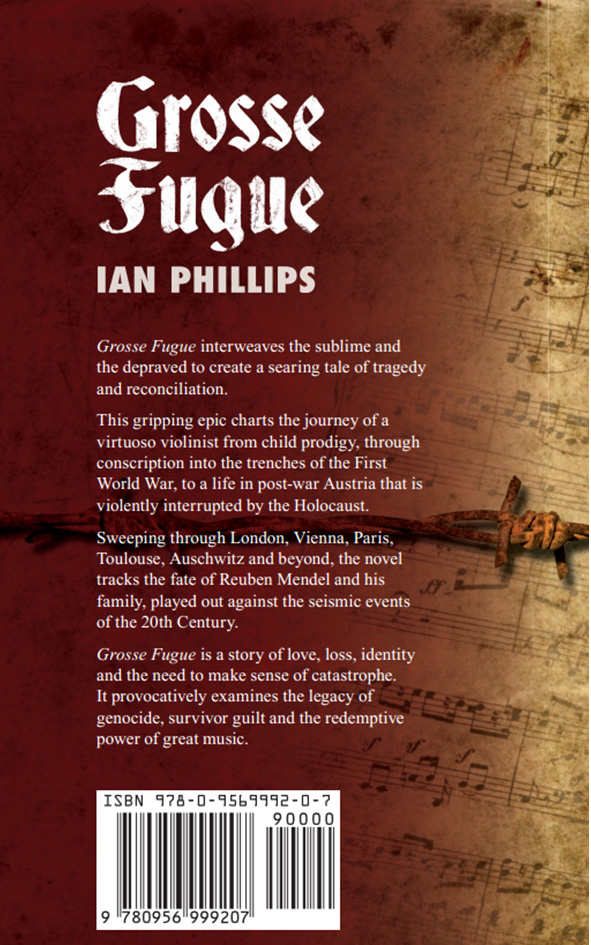This week, ‘Grosse Fugue’ finally appeared, ready for its soft launch. If you’ll permit, I’m going to be even more self-indulgent than usual.

Is the end also a beginning?
This week, ‘Grosse Fugue’ finally appeared, ready for its soft launch. If you’ll permit, I’m going to be even more self-indulgent than usual.
I can now hold in my hand a printed book of something that was once merely a figment of my imagination and a plan sketched out in a notebook.
For large tranches of the intervening period, I barely dared to hope that, one day, it might be able to take its place on bookshelves in homes, shops and libraries. That it might jostle for space with heroes like Primo Levi and George Orwell, well who could even dream of such a thing!
And yet, here it is, and here I am.
What’s strange is that I feel somewhat empty. I’m not looking for sympathy, I hasten to add. I know how fortunate I am to have got here. But in the confessional nature of some of these blogs, it seems to me that I ought to be honest.
First things first, I am a perfectionist. I also subscribe to Kant’s dictum that ‘from the crooked timber of humanity no straight thing can ever be made’. So I am alive to the novel’s flaws and imperfections, blinded by the might-have-beens. I’m a glass-half-empty kind of guy; in fact, I’m pretty sure someone peed in it when I wasn’t looking.
I revisit the entire editing process and think of all the times I might have been more assertive or built in more buffers to allow for reading the latest changes with some distance and detachment. My only consolation is that when it’s a runaway success (ahem), I can seek a revised reprint that allows for more improvement (and even revisits my original ending). Well, is there any harm in dreaming?
I’m also painfully aware that the high ambitions I set for ‘Grosse Fugue’ may well remain unfulfilled. While unpublished, there was no risk of failure or of a full frontal attack on the ideas it contains. Now, I’m a bit like a stand-up comedian – hopelessly exposed and nowhere to hide. It’s a strange sense of nakedness.
So this is a new phase. At the age of 58, I think I can say with some confidence that it’s never too late to live your dreams, and I’m so grateful to my publisher that they have enabled me to proclaim that. Leonard Cohen sang ‘there ain’t no cure for love’. We all know that there ain’t no cure for writing, either. Once bitten, we are forever infected. I feel the fever rising once again as I begin to think about the next book.
As I look at ‘Grosse Fugue’, I find myself drawn to some great words by Zamyatin: “True literature can exist only where it is created, not by diligent and trustworthy functionaries, but by madmen, hermits, heretics, dreamers, rebels, and sceptics.”
And I wonder which, if any, am I.
Ian Phillips is a freelance writer for businesses whose first novel, Grosse Fugue, is being published by Alliance Publishing Press. Further information is now available at www.alliancepublishingpress.com. He’s tweeting developments @Ian_at_theWord.
It feels strange, Christina, as I tried to impart.
Holding the thing is weird, like it's not really mine any more. The bizarre thing is that people are now reading it, as a book, and it now needs to come into its own and stand comparison with each individual's preferences, prejudices and perspectives.
The editing're-writing process is bizarre - a constant quest for perfection. But I try and remember Balzac's great novella - Le Chef D'oeuvre Inconnu - about an artist who strives for so long to paint a portrait, only to end up with something incomprehensible. There comes a time when we have to put our work aside and say that it is done.
I think that, for me, the most tangible benefit of publication is that I can no longer tinker with it ad infinitum. I am, to a great extent, free of it at last
Many thanks, Meagan.
Book length is, of course, a real issue for us all. With mine, the first draft was 88,000. After a rigorous re-write and vicious winnowing, I triumphantly managed to reduce it to 93,000 (sic) - I've no idea how that happened. The final m/s submitted was 104,000 (more brilliant editing by me) and the printed version, post-professional edit was 94,000, which translated to 307 printed pages.
Of course, I'm tempted to say that the right length is the right length and I'm not at all certain that this is genre-specific. I think that 'Grosse Fugue' is literary fiction - but that would encompass both 'War & Peace' and 'The Kreutzer Sonata', works of completely different extents.
Instinctively, I'm not sure how critical length is at present for you. The seduction process you're about to embark upon will, I imagine, consist of covering note, synopsis and some specimen chapters. We all want our work judged on its own, entire merits - but that is unlikely to happen and judgements will be made, for better or worse, on sample material. When you get a deal, then the horse-trading on extent can begin. The key thing, to my mind, is to sell in hard and suppress any negatives.
Hope that helps, Meagan.
Hi Adrian, thanks so much.
I feel you and I are locked into a kind of 'Duelling Quotists' which, I sense, I am doomed to lose. Another excellent contribution!